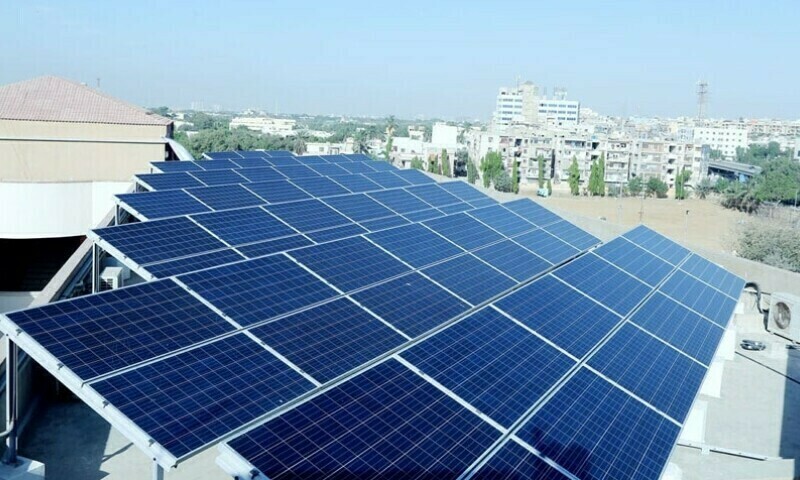• ECC slashes solar net-metering buyback rate by one-third, ends net billing
• Under new framework, consumers to sell at Rs10, buy at Rs42-48 per unit
ISLAMABAD: In yet another knee-jerk reaction to curb renewable energy growth through solar net metering amid high grid electricity costs, the government on Thursday reduced the buyback rate by one-third to Rs10 per unit and scrapped net billing.
The decision, applicable to new net-metering consumers, was taken at a meeting of the Economic Coordination Committee (ECC) of the Cabinet, presided over by Finance Minister Muhammad Aurangzeb.
Under the revised policy, power companies will purchase surplus solar electricity from consumers at Rs10 per unit during the day while selling grid electricity at Rs42 per unit (off-peak) and Rs48 per unit (peak) after sunset — excluding taxes and duties.
Additionally, consumers will no longer be allowed to install solar capacity exceeding their sanctioned load, except for a 10 per cent cushion, compared to the 50pc margin permitted under the previous policy.
Existing consumers will gradually come under this new framework as their seven-year contracts expire.
The Power Division justified the policy shift, claiming that the existing net-metering consumers were causing nine-paisa per unit impact on average electricity costs with a total annual impact of Rs101 billion, which could increase to Rs3.6 per unit (Rs545bn) by 2034 if allowed unhampered.
Petroleum Minister Ali Pervez Malik criticised the move, saying it would send a bad signal to the market and consumers and could have been handled better.
Power Miniter Awais Leghari stressed that duty or taxation would have also negatively affected off-grid solarisation and agricultural tubewells, which could neither be regulated nor the intended area.
Mr Leghari suggested that the real issue lay with urban middle-class consumers, whom he described as the “affluent” sector benefiting from low-cost self-generated electricity while avoiding capacity charges and transmission costs.
An official pointed out that salaried and urban consumers, already paying high taxes and relying on expensive, inefficient and unreliable grid electricity, would now be forced to sell their surplus solar power at Rs10 per unit while buying at Rs65-70 per unit during peak hours — or invest in costly battery storage to go off-grid entirely.
Lack of consultation
The Power Division did not present any independent assessment of such speculations. No prior consultation was done with the relevant stakeholders, including the power regulator Nepra, the Federal Board of Revenue and the Ministry of Finance.
The division claimed the summary had been circulated to Nepra, the Ministry of Industries and the National Energy Efficiency and Conservation Authority (Neeca). However, their views and comments could not be secured due to the urgency of the matter.
The ECC allowed the Power Division to issue policy guidelines to Nerpa for “revision of buyback rate from national average power purchase price to Rs10 per unit” for now and from time to time in future.
The settlement mechanism shall be made “in such a way that imported and exported units would be treated separately for billing. The units exported shall be bought at the approved buyback rate (Rs10) and the imported units would be billed at the applicable peak/off-peak rates”.
In addition, in case the total amount of bills against the units exported by the net metering consumers exceeds the total amount of bills against the units imported, the net amount shall be credited to the consumers in the subsequent billing cycle without any provision for consumers to encash those credited units.
Regulatory adjustments
Nepra will be required to set a cap on the hosting capacity of each distribution transformer and feeder. It would also be required to set standards for inverters that facilitate real-time grid interaction, including voltage and frequency regulation and support communication interfaced with Discos with Wi-Fi, GSM, etc.
The Power Division highlighted the pressing need for regulatory adjustments, citing a record decline in solar panel prices that has led to a sharp increase in the number of solar net-metering consumers.
As of December 2024, solar net-metering consumers had transferred a burden of Rs159bn to grid consumers, a figure expected to rise to Rs4.24 trillion by 2034 without timely amendments.
The ECC was informed that the number of solar net-metering consumers surged significantly, reaching 283,000 by December 2024, up from 226,440 in October 2024.
The ECC also approved a summary of the Ministry of Maritime Affairs regarding the export of potassium sulphate fertiliser from Gwadar Port and allowed an exemption for Agven Private Ltd, operating in the Gwadar North Free Zone, to export up to 10,000 tonnes annually or 50pc of actual production, whichever is lower, until Dec 31, 2025.
The decision meant supporting the development of the Gwadar Free Zone while ensuring regulatory oversight through biannual shipment limits and data monitoring mechanisms.
The ECC approved about Rs1.2bn worth of five supplementary grants, including Rs250 million to the Ministry of Federal Education, Rs220m to the Ministry of Industries for small and medium enterprises (SMEs), Rs36.1m to the Ministry of Interior for helicopter maintenance for Sindh Rangers, Rs15m for helicopter maintenance for Frontier Corps Balochistan, and Rs670m for Sustainable Development Goals spending in Islamabad.
Published in Dawn, March 14th, 2025


